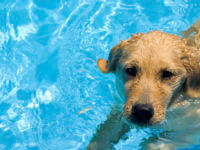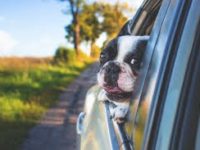About a day after we picked Magic up from boarding, he began to sound more and more like a goose than a dog. He seemed like he felt like his normal self aside from the coughing and runny nose, but something was clearly not normal because he honked and hacked all night long. We had heard about how dogs in boarding can easily catch “kennel cough”, so we took him to the veterinarian to make sure.
Magic’s vet explained that “kennel cough” is the broad umbrella term used to describe illnesses which cause coughing symptoms after a dog has spent time around other dogs. Kennel cough type symptoms can include coughing, nasal discharge, eye discharge, sneezing, and reverse sneezing. Reverse sneezing, an unusual sounding type of cough, occurs when certain breeds try to clear their throat to reduce irritation caused by nasal drainage.
Magic still had normal energy levels and eating habits despite his illness, but dogs with more serious cases might become lethargic and lose their appetite. Prolonged cases can lead to pneumonia, so dogs with a lingering cough should receive veterinary treatment. Coughing can also be caused by several different health problems aside from kennel cough illnesses, so coughing dogs should be examined by a veterinarian for diagnosis and appropriate treatment.
The oral bordetella vaccine helps protect against bordetella, a commonly found bacterial respiratory disease which causes kennel cough symptoms. Many boarders require their guests to be up to date on the vaccine because the illness can spread through dog to dog contact or by sharing space. Magic’s veterinarian explained that even though he received his bordetella vaccine every year, other bacteria and viruses not included in the vaccine can also cause kennel cough symptoms.
Treatment for kennel cough illnesses can vary depending on the symptoms and the severity of the illness. Because Magic’s case was mild, his veterinarian recommended rest and antibiotics and he did not require extensive treatment.
The bordetella vaccine is not a required vaccine, but is recommended for dogs who frequently spend time around other dogs at boarding or day care. The vaccine does not guarantee the patient will never have “kennel cough”, but it protects against one of the most commonly found diseases which causes kennel cough symptoms.



